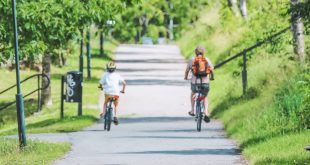COVID-19 has had a ‘substantial’ impact on active travel, with the DfT’s National Travel Attitudes Survey (NTAS) showing an increase in the frequency of cycling and walking among those who already cycle and walk.
When interviewed between May and September 2020, 34% of cyclists said they cycle more and 38% of walkers said they walk more than before the outbreak of the pandemic.
This year, the NTAS centres around travel attitudes in relation to the COVID-19 pandemic and travel restrictions. The data is used to assess the impacts of transport policies, monitor trends in travel, and explain transport patterns amongst different groups of people.
An average of 20% of pre-pandemic walkers and cyclists reported walking or cycling less, compared to 36% who walked or cycled more than before. These respondents were further asked how likely it was that they would continue to walk or cycle more once travel restrictions and social distancing were available, with 94-95% stating it was likely.
The lack of confidence in the use of public transport may remain after travel restrictions and social distancing measures have been removed, the survey found. Nearly two-thirds of respondents said it was very likely or fairly likely that they will avoid using public transport if it is crowded once travel restrictions have been removed.
Rachel White, head of public affairs at Sustrans, said: “Throughout the last year, the COVID-19 pandemic has disrupted people’s travel patterns and highlighted demand for investment in walking and cycling.
“The findings from the National Travel Attitudes Survey show there has been an increase of the frequency of walking (38%) and cycling (34%) among those who already walk and cycle, along with a substantial increase (164%) in trips taken for exercise in comparison to 2019. These findings are positive, and not surprising considering how COVID-19 forced many to live and travel more locally.
“We must focus on making it easier for more people to walk and cycle by providing the necessary infrastructure and support so that those who would like to start walking and cycling for everyday journeys but currently do not feel able are encouraged to do so.
“Shifting everyday trips from private motorised vehicles can help cut pollution, tackle the causes of poor health, and improve the safety of our streets. As public transport capacity remains limited by the pandemic, we need to support more people to travel actively where they can, otherwise, we run the risk of more people relying on motor vehicles to move around.
“In order to ensure people are not locked into car dependency once measures are lifted, local authorities should use the next stage of funding from the Department for Transport to continue to work with communities to put measures in place which make it easier for more people to walk and cycle their everyday journeys.
“Many of the actions outlined from the Government as part of the £2 billion committed to walking and cycling over the next five years, such as radically improving the quality of walking and cycling infrastructure and introducing cycle training for all, have the potential to help reduce some of the existing inequalities in cycling and mark a step forward in making active travel easier and more inclusive.”
Read the January issue of BikeBiz below:
 BikeBiz Bicycle and cycling retail news
BikeBiz Bicycle and cycling retail news




